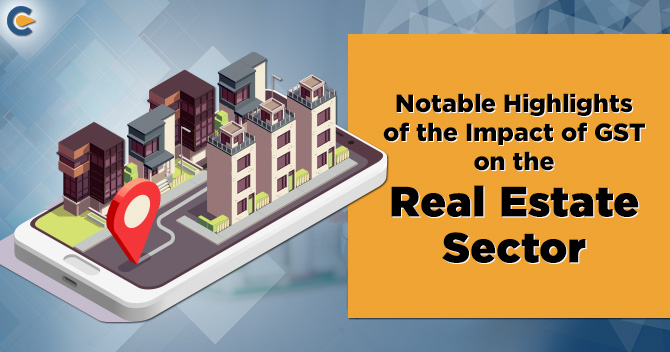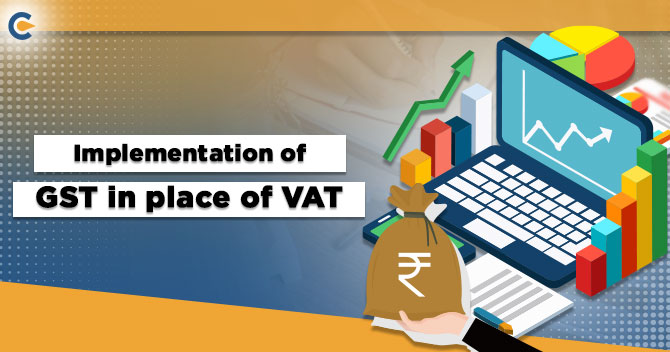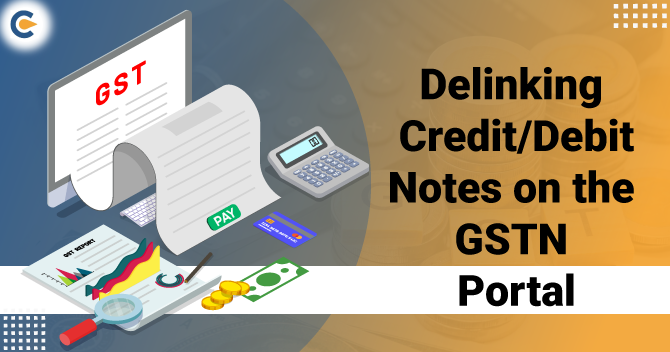The impact of GST on the real estate sector has been a remarkable one. Goods and Service Tax came into the picture on 1st July 2017. It has turned out to be a difference-maker across various sectors of the Indian economy. The real estate sector in India is prospering at a breakneck speed. Over the years, several multinational organizations have shown their faith in the real estate sector of India, as it ensures enormous returns on investments. The real estate market is expected to bounce from Rs 12,000 crore to Rs 65,000 crore by 2040.
The real estate sector plays a very crucial part in the progress of any country’s economy. The real estate sector accounts for 6 to 8% of its GDP in India. Nation has been observing many notable changes in the real estate industry after the implementation of goods and service tax in India. Developers and builders have raised the concern concerning high GST rates on real estate properties. The government of India has provided major relaxation by bringing a reduction in the GST rates on the projects related to the real state.
With its origin, goods and service tax came as a replacement for various indirect taxes in India like service tax, CST, VAT, and central excise duty and more. Earlier, the rate at which real estate got taxed was 12%, and in the current time, it is taxed at a 5% rate. The new GST regime has encompassed all the taxes into a single unit and has provided a much-expected boost to the real estate sector.
Introduction of New GST Rates – Impact of GST on the Real Estate Sector
On the 24th of February 2019, the GST council[1] had come up with new GST rates for residential real estate properties. The GST council removed the benefits of Input Tax Credit and granted a transition plan to the developers with two options of availing the reduced goods and service tax rate without input tax credit benefit or availing the ITC benefit with the old goods and service tax rates. Before swimming into the depth of the impact of GST on the real estate sector, let’s have a look at the current GST rates prevailing in the real estate sector.
- After the removal of Input Tax Credit, the GST rates on affordable houses will be 1%.
- After the removal of Input Tax Credit, the GST rates on normal housing properties will be 5%.
- Along with ITC benefits, the GST rates on commercial properties will be 12%.
This revised scheme is mandatory for those projects that get commenced on the 1st of April 2019 or after this date.
Coverage on Impact of GST on the Real Estate Sector – Key Points
- On the one hand, Under-construction units got their place in the 5% tax segment. On the other hand, there is a provision of a complete tax exemption for those completed properties that hold a certificate. We can say that there was a rising interest in completed properties when compared with those going through the construction process.
- Things become more transparent as well as accountable after the GST, and its modifications came into play.
- In terms of pricing, there weren’t any valuable changes in the entire price of the property after the Input Tax Benefit removal and registration charges and stamp duty got exempted.
- Buyers’ interest got hit due to the developers filing for insolvency and the delays linked with the under-construction units.
- The main reason behind this segment witnessing only rare investments from the buyers’ end was the presence of various taxes related to the construction purpose materials leads to the increase in the overall construction.
- In the real estate market, the segment that has received maximum benefits is the rental market. The rental market of the real estate sector has won sizeable fame with the GST exemption on residential properties rented for the sake of residential prospects and a GST of 18% on maintenance charges more than Rs 7500 per month/member.
- With an increase in the threshold limit for rental properties for commercial usage from 10 lakhs to 20 lakhs, tax liability on the property owners got reduced.
- With 1% GST imposed on affordable housing units or units within the economic segment became a profit-making option for them.
- Despite having so many positives, various points exist that scare off the investment made in the real estate sector. These points are-
- ITC benefits removal
- Registration charges and stamp duty exemption that presents a burden to the buyers
- Cumbersome GST calculation process and many confusions related to the process
- Other points
- Another aspect is the reverse charge mechanism, where the initiation of goods and service tax has filled negativity into the people’s mind.
Reverse Charge Mechanism along with its Impact
- The concept of reverse charge mechanism has arisen from the previous tax regime. In service tax, the applicability of reverse charges was in the case of certain notified services. On similar lines, in VAT, in most of the states, a registered person had to go for paying taxes to the government in case purchases were made from dealers who were not registered. Similarly, the applicability of reverse charge was in the case of imports, where the government receives the import duties from the importer end.
- With the expansion of the scope of RCM in GST, developers would get impacted in an adverse manner.
- Under GST law, meaningful addition to reverse charge mechanism is, if goods are received from a person who is an unregistered person under GST, and then it is the responsibility of a registered person under GST to make payment for GST on supplies of similar nature.
- The developer has to pay GST in cases where services are received from the end of transporters of goods, an individual or firm providing legal services, local authorities, or government rendering the services just like municipalities, etc.
- Furthermore, under GST, the developer won’t be able to make adjustments in the tax payable under reverse charge mechanism against the available input credit from the goods and service tax paid on the inputs. In place of that, it has to be paid via bank or cash payment.
- Eventually, it would lead to an increase in the costs and will impact the developers in a negative manner, especially here we are referring to the small developers.
Impact of GST on the Real Estate Sector- Contractors/Builders/Developers
- Developers had to bear customs duty, VAT, excise duty, entry taxes, and other taxes on inputs or raw materials and service tax on input services like labor charges, approval charges, legal fees, professional fees, and so on, all this under the previous tax regime. Due to the unavailability of the input tax credit for duties like entry tax, customs duty, and CST, etc., pricing got impacted, and there was a transfer of burden to the buyer.
- Developers would see up-gradation in the margins due to the reduction in developers’ construction costs along with the additional benefit of reduction in logistics cost. Since multiple taxes are incorporated, and the input tax credit is available, developers’ construction costs would witness a significant reduction under goods and service tax.
- Considering the negatives, to reach input tax credit, developers would have to attempt for multiple calculations in an endeavor to pass it on to the buyers. Thus, in maximum cases, they can pass on the input tax credit at the time of the final stages. Developers would get affected due to the lack of transparency on the input tax credit. Moreover, buyers may defer their buying decisions after following the“Wait and watch approach.”
- There were no records available in the books related to portions of expenditure in the former laws. Under the system of expenditure recording, invoicing cloud storage, along with the availability of credit on inputs got reduced under goods and service tax.
Read our article:Enlightening about the Impact of GST on the Hospitality Industry
Impact of GST on the Real Estate Sector- Buyers
As per the earlier tax regime, buyers had to pay service tax, value-added tax, registration charges coupled with stamp duty on the purchase of under-construction properties. There was a variation in the prices of properties from one state to another since VAT, stamp duty, and charges for registration were state levies. Most importantly, developers had to pay several duties like OCTROI, custom duty, sales tax, and so on for which there was the unavailability of credit.
For properties that are still in the process of construction, there will be the applicability of a single tax rate of 12% under GST. However, there is no applicability of GST on ready to sale or completed properties, which was the case in the former. Hence, buyers would enjoy the benefit of price reduction under goods and service tax.
In the short term, buyers will be gaining more insights on the impact of GST on prices of the property and can suspend the buying decisions by adhering to the “wait and watch” approach.
In the long term, goods and service tax would favor the buyers in case of the passing of the ITC benefits received by the developers to the buyers.
Impact of GST on the Real Estate Sector- Other Stakeholders
The real estate industry would get consequentially impacted if the impact on the allied services like service suppliers, labor along with material suppliers, etc. depends on the increment and even decrease in the tax levied on these items.
For instance, in the past, cement got taxed on an effective rate between 27 and 31% will now get taxed at 18%. With the increasing prices of cement, there would be an increase in the overall construction cost for sure.
GST Rates for the items of Construction Industry
- The rate of goods and service tax for steel is 18%.
- The rate of goods and service tax on cement is 18%.
- The rate of goods and service tax on marble and granite is 28%.
- The rate of goods and service tax on fly ash bricks and sand is 12%.
- The rate of goods and service tax on sand is 5%.
- The rate of GST on paints is 18%.
Categories of Properties
Properties got divided into three different categories-
- Properties priced within the limited amount of Rs 45 lakh in metropolitan/non-metropolitan regions.
- Properties have the total carpet area not crossing the limit of 60 square meters in metropolitan regions, including Bangalore, Chennai, Delhi NCR, Hyderabad, Kolkata, and MMR, i.e., Mumbai Metropolitan Region.
- Properties whose cumulative carpet area should not cross the limit of 90 square meters in non-metropolitan towns and cities.
Stamp Duty Applicability
Registration charges and stamp duty get excluded for the limited scope of GST calculation. Applicability of stamp duty would proceed on under-construction properties as well as completed properties.
Real Estate Projects Amid COVID-19 Outbreak – De-stressing the developers
COVID-19 pandemic has hampered the construction of real estate projects, creating problems related to cash flow for the developers. Union Finance Minister, Nirmala Sitharaman, has asked the states to extend the deadlines for all the real estate projects registered under the Real Estate Regulatory Authority (RERA). Applicability of this point will be for all real estate registrations, either expiring on 25th March or after this date.
Additionally, Union Finance Minister Nirmala Sitharaman stated that the COVID-19 pandemic must get considered as the” Act of God” under Real Estate Regulatory Authority (RERA). As a result, the urban development ministry would circulate an advisory to all the states as well as urban territories so that the various regulatory authorities can put the “force majeure” clause into effect.
Chairman of Anarock Property Consultants, Mr. Anuj Puri, said that this prominent move would release the stress from the minds of the developers.
In the Nutshell
The unprecedented growth of the real estate sector seems to be unstoppable in the forthcoming years. As the government has opened the door for foreign investors to come and make the investment in the real estate sector of the nation, the real estate sector would keep on contributing to the economy of India. The country has already witnessed many changes after GST implementation, and they have to see a lot more in the coming time. The new GST regime has enveloped all the taxes into a sole unit and is boosting the real estate sector. We hope that you will get familiar with the impact of GST on the real estate sector in India after thoroughly reading this article.
Read our article:Elucidation on GST Refund Issues – Recent Updates










